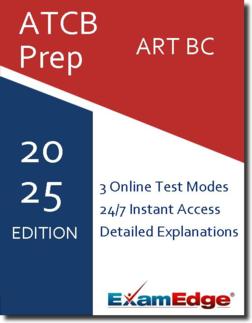ATCB ART-BC (ATR) Practice Tests & Test Prep by Exam Edge - FAQ
Based on 28 Reviews
- Real Exam Simulation: Timed questions and matching content build comfort for your ATCB ART-BC test day.
- Instant, 24/7 Access: Web-based ATCB Art Therapist Board Certified practice exams with no software needed.
- Clear Explanations: Step-by-step answers and explanations for your ATCB exam to strengthen understanding.
- Boosted Confidence: Reduces anxiety and improves test-taking skills to ace your ATCB Art Therapist Board Certified (ATR).

Why should I use Exam Edge to prepare for the ATCB Art Therapist Board Certified Exam?
FAQ's for Exam Edge ATCB Art Therapist Board Certified practice tests
- Comprehensive content: Exam Edge's ATCB Art Therapist Board Certified practice tests are created specifically to prepare you for the real exam. All our ATCB ART-BC practice test questions parallel the topics covered on the real test. The topics themselves are covered in the same proportions as the real test too, based on outlines provided by the Art Therapy Credentials Board in their ATCB ART-BC test guidelines.
- Realistic practice: Our ATCB ART-BC practice exams are designed to help familiarize you with the real test. With the same time limits as the real exam, Our ATCB practice tests enable you to practice your pacing and time management ahead of test day.
- Detailed explanations: As you complete your practice tests, we show you which questions you answered correctly and which ones you answered incorrectly, in addition to providing you with detailed step-by-step explanations for every single ATCB Art Therapist Board Certified practice exam question.
- Performance insights: After you complete a practice test, we provide you with your raw score (how many you answered correctly) and our estimate of the ATCB ART-BC score you would have received if you had taken the real test.
- Ease of access: Because all Our ATCB practice tests are web-based, there is no software to install. You can take ATCB ART-BC practice exams on any device with access to the internet, at any time.
- Flexible use: If you must pause while taking one of Our ATCB practice exam, you can continue right where you left off. When you continue the test, you will start exactly where you were, and with the same amount of time you had remaining.
- Thousands of unique questions: We offer 5 different online practice exams with 500 unique questions to help you prepare for your ATCB Art Therapist Board Certified !
- Low cost: The cost of ordering 5 practice tests is less than the cost of taking the real ATCB ART-BC test. In other words, it would be less expensive to order 5 practice tests than to retake the real ATCB Art Therapist Board Certified exam!
- Our trusted reputation: As a fully accredited member of the Better Business Bureau, we uphold the highest level of business standards. You can rest assured that we maintain all of the BBB Standards for Trust.
- Additional support: If you need additional help, we offer specialized tutoring. Our tutors are trained to help prepare you for success on the ATCB Art Therapist Board Certified exam.
What score do I need to pass the ATCB ART-BC Exam?
To pass the ATCB Art Therapist Board Certified test you need a score of 112.
The range of possible scores is 0 to 150.
How do I know the practice tests are reflective of the actual ATCB Art Therapist Board Certified ?
At Exam Edge, we are proud to invest time and effort to make sure that Our ATCB practice tests are as realistic as possible. Our practice tests help you prepare by replicating key qualities of the real test, including:
- The topics covered
- The level of difficulty
- The maximum time-limit
- The look and feel of navigating the exam
Do you offer practice tests for other Art Therapy Credentials Board subjects?
Yes! We offer practice tests for 2 different exam subjects, and there are 10 unique exams utilizing 1000 practice exam questions. Every subject has a free sample practice test you can try too!
ATCB Art Therapist Board Certified (ATR)
Practice Tests
ATCB Registered Art Therapist
(ATR
®
)
Practice Tests
To order tests, or take a sample test, for a different subject:
Click on ' Name on the Exam Name' You will be take to the orders page
How do I register for the real Art Therapy Credentials Board?
For up-to-date information about registration for the Art Therapy Credentials Board, refer to the Art Therapy Credentials Board website.


